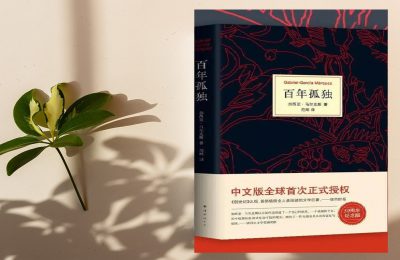《百年孤独》,是哥伦比亚作家加西亚·马尔克斯创作的长篇小说,是其代表作,也是拉丁美洲魔幻现实主义文学的代表作,被誉为“再现拉丁美洲历史社会图景的鸿篇巨著”。故事讲述马孔多小镇和布恩地亚家族的兴衰变化与传奇故事,记录了家族命运与百年历史,是重复地叙述相同而荒唐的命运,是拉美国家几百年命运的缩影,独具意味地隐喻着人类“文明”史的建立、发展与终结,在荒凉失落与荒唐可笑中诠释宿命式的轮回。家族中人物名字是相同或相近的,预示着他们拥有殊途同归的孤独命运。《百年孤独》以布恩地亚被捆在树上为开端,以他被蚂蚁吃掉为结束,通过细腻丰富的笔触、大胆自由的想象、魔幻的叙事艺术,讲述布恩地亚家族命运与历史,刻画人物孤独的灵魂与自我救赎,进而体现出个人、家族及全人类的悲悯与孤独情怀,让人们重新思考时代发展与人性变化。《百年孤独》被世界文坛誉为魔幻现实主义文学的主峰,已被翻译成30多种文字出版,销量逾1000万册。
Chapter 2
WHEN THE PIRATE Sir Francis Drake attacked Riohacha in the sixteenth century, ?rsula Iguarán’s great-great-grandmother became so frightened with the ringing of alarm bells and the firing of cannons that she lost control of her nerves and sat down on a lighted stove. The burns changed her into a useless wife for the rest of her days. She could only sit on one side, cushioned by pillows, and something strange must have happened to her way of walking, for she never walked again in public. She gave up all kinds of social activity, obsessed with the notion that her body gave off a singed odor. Dawn would find her in the courtyard, for she did not dare fall asleep lest she dream of the English and their ferocious attack dogs as they came through the windows of her bedroom to submit her to shameful tortures with their red-hot irons. Her husband, an Aragonese merchant by whom she had two children, spent half the value of his store on medicines and pastimes in an attempt to alleviate her terror. Finally he sold the business and took the family to live far from the sea in a settlement of peaceful Indians located in the foothills, where he built his wife a bedroom without windows so that the pirates of her dream would have no way to get in.
In that hidden village there was a native-born tobacco planter who had lived there for some time, Don Jos?Arcadio Buendía, with whom ?rsula’s great-great-grandfather established a partnership that was so lucrative that within a few years they made a fortune. Several centuries later the great-great-grandson of the native-born planter married the great-great-granddaughter of the Aragonese. Therefore, every time that ?rsula became exercised over her husband’s mad ideas, she would leap back over three hundred years of fate and curse the day that Sir Francis Drake had attacked Riohacha. It was simply a way. of giving herself some relief, because actually they were joined till death by a bond that was more solid that love: a common prick of conscience. They were cousins. They had grown up together in the old village that both of their ancestors, with their work and their good habits, had transformed into one of the finest towns in the province. Although their marriage was predicted from the time they had come into the world, when they expressed their desire to be married their own relatives tried to stop it. They were afraid that those two healthy products of two races that had interbred over the centuries would suffer the shame of breeding iguanas. There had already been a horrible precedent. An aunt of ?rsula’s, married to an uncle of Jos?Arcadio Buendía, had a son who went through life wearing loose, baggy trousers and who bled to death after having lived forty-two years in the purest state of virginity, for he had been born and had grown up with a cartilaginous tail in the shape of a corkscrew and with a small tuft of hair on the tip. A pig’s tail that was never allowed to be seen by any woman and that cost him his life when a butcher friend did him the favor of chopping it off with his cleaver. Jos?Arcadio Buendía, with the whimsy of his nineteen years, resolved the problem with a single phrase: “I don’t care if I have piglets as long as they can talk.?So they were married amidst a festival of fireworks and a brass band that went on for three days. They would have been happy from then on if ?rsula’s mother had not terrified her with all manner of sinister predictions about their offspring, even to the extreme of advising her to refuse to consummate the marriage. Fearing that her stout and willful husband would rape her while she slept, ?rsula, before going to bed, would put on a rudimentary kind of drawers that her mother had made out of sailcloth and had reinforced with a system of crisscrossed leather straps and that was closed in the front by a thick iron buckle. That was how they lived for several months. During the day he would take care of his fighting cocks and she would do frame embroidery with her mother. At night they would wrestle for several hours in an anguished violence that seemed to be a substitute for the act of love, until popular intuition got a whiff of something irregular and the rumor spread that ?rsula was still a virgin a year after her marriage because her husband was impotent. Jos?Arcadio Buendía was the last one to hear the rumor.
